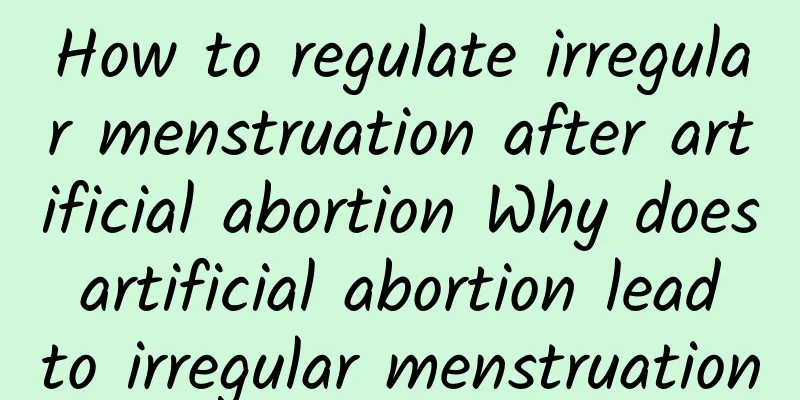How to regulate irregular menstruation after artificial abortion Why does artificial abortion lead to irregular menstruation

|
1. Causes of irregular menstruation after artificial abortion Having sex and taking a bath too early after surgery. Some women have sex with their husbands a few days after surgery, or take a bath without following the doctor's advice, which causes bacteria to invade the vagina and uterus, resulting in uterine cavity infection, irregular menstruation and amenorrhea. Excessive mental tension and anxiety. Fear before surgery, fear of abortion or mental burden caused by inability to get pregnant, especially feeling ashamed of getting pregnant before marriage. If this emotion fails to change after surgery, it may lead to amenorrhea. Individual differences. Everyone's body is different. Some women's endocrine system changes after artificial abortion, and the level of chorionic gonadotropin drops suddenly, which makes the ovaries unable to respond to the gonadotropin from the anterior pituitary gland for a while, resulting in the endometrium not changing according to the cycle and amenorrhea. Frequent artificial abortions. Some women have several abortions in a year, which causes the endometrium to be scraped thin and cannot be restored in a short period of time. If the basal layer of the endometrium is completely damaged, it can lead to permanent amenorrhea, while partial damage can cause temporary amenorrhea. 2. Postoperative precautions After an abortion, you should rest in bed for 2-3 days. You can get out of bed and move around later, gradually increasing the time spent on activity and watching less newspapers and TV. Within 2 weeks after the operation, you should rest in bed appropriately. Do not engage in heavy physical labor within half a month after the abortion and avoid contact with cold water. Eat more nutritious food to restore your body to normal as soon as possible. Keep the vulva clean and hygienic, change sanitary napkins frequently 1 to 2 times a day. Do not take a sitz bath within 2 weeks or before vaginal bleeding has stopped. The cervix has not closed after abortion, and the endometrium also has a process of repair. During this period, special attention should be paid to keeping the vulva clean and hygienic. Do not take a tub bath within half a month after surgery to prevent unclean water from entering the vagina, leading to bacterial invasion and infection. Avoid sexual intercourse within one month to prevent genital infection. If you have fever, abdominal pain, or vaginal discharge with an unusual odor, seek medical attention immediately. Generally, vaginal bleeding stops gradually in 3 to 5 days and lasts no longer than 10 to 15 days. If the amount of vaginal bleeding exceeds the amount of menstrual blood and lasts for too long, you need to seek medical treatment in time. |
>>: How to regulate irregular menstruation for women? Is irregular menstruation harmful to women?
Recommend
Recovery time for abnormal vaginal discharge
The recovery time for abnormal vaginal discharge ...
How can women avoid pelvic peritonitis?
I believe that many people are already familiar w...
Does polycystic ovary often cause stomach pain?
Polycystic ovary syndrome (PCOS) does not necessa...
Poor metabolism will lead to constipation and obesity! Beautiful Chinese medicine practitioner: tapping meridians to slim the abdomen and get rid of butterfly sleeves
Since the third-level alert for epidemic preventi...
Abnormal emotions can easily cause menstrual irregularities in patients
To treat irregular menstruation, we must first de...
How to prevent miscarriage during pregnancy?
How to prevent miscarriage during pregnancy? Many...
What to do when you have back pain during menstruation
Back pain during menstruation is a common discomf...
Will cervical erosion affect pregnancy? Women must know what cervical erosion is.
Many women are told that they have cervical erosi...
Diet therapy for polycystic ovary
Women with polycystic ovaries do not have any sym...
What are the diagnostic tests for vaginitis?
Treatment of vaginitis starts with examination an...
What are the reactions to miscarriage?
If a woman does not protect herself properly afte...
The rock bath actually smells like medicine! Ginseng replenishes Qi and adjusts physical condition
Office workers are under great work pressure, whi...
There are five main methods to regulate irregular menstruation
Irregular menstruation is a very common phenomeno...
How to relieve severe dysmenorrhea? Try these 4 tips
Dysmenorrhea is a phenomenon that many people fin...
Brief Analysis of Traditional Chinese Medicine in Treating Endometrial Tuberculosis
The TCM treatment of endometrial tuberculosis is ...









